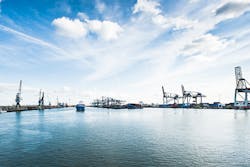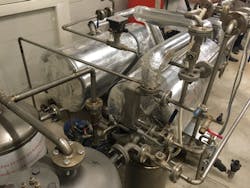ZERO BRINE is a European Union (EU) Horizon 2020 Innovation Action project that advances circular economy business model solutions by redesigning the value chains of industrial wastewater. Coordinated by TU Delft with 22 partners from 10 countries, the €11 million project aims to close the water cycle by recovering and reusing the minerals and water from the brine (saline-impaired effluents) of process industries over four years beginning June 2017. ZERO BRINE will implement four large-scale demonstrations at industrial sites: a water plant in the Netherlands, a silica factory in Spain, a coal mine in Poland and a textile factory in Turkey.
The concept of the ZERO BRINE project
The process industry is the major source of chloride releases in Europe, with the chemical industry representing the vast majority at 11.5 million tons/year. These releases are complex effluents and represent a big challenge for companies in terms of management and costs. The concept of the ZERO BRINE project is to close the loop of these particularly problematic effluents by developing the necessary concepts, technological solutions and business models, while eliminating wastewater discharge and minimizing the environmental impact of industrial operations through brines, i.e., zero brine. The materials to be recovered include minerals (for example, sodium chloride and magnesium hydroxide), regenerated acids, caustics and water. These materials will be recycled in the same process industries that produce the brines (internal valorization) and other process industries that do not produce these streams (external valorization).
“The concept of the ZERO BRINE project is to close the loop of problematic effluents by developing concepts, technological solutions and business models, while eliminating wastewater discharge and minimizing the environmental impact of industrial operations through brines.”
A large-scale demonstration plant will be developed in the energy port and petrochemical cluster of Rotterdam Port in the Netherlands, involving large local industries. The plant will be able to treat part of the brine effluents generated by a demineralized water supplier (Evides Industriewater), while waste heat will be sourced by neighboring factories. For demineralized water production, softening of raw water is required, which is often performed by ion exchange units. During this process, the hardness ions, namely calcium and magnesium, are exchanged with sodium ions. The ion exchange unit needs to be regenerated before used again, using a solution of sodium chloride (NaCl). In the demonstration plant, the chemicals needed to regenerate the softening units will be recovered from the brine effluent (internal valorization). At the same time, other valuable minerals are produced with cross-fertilization opportunities for other supply chains.
Replicable and scalable
The ZERO BRINE large-scale demonstration plants provide the potential for immediate replication and uptake of the project results after its successful completion. Industrial symbiosis will play a key role in cutting down costs as well as environmental impacts through waste heat recovery. To facilitate market uptake, ZERO BRINE is developing an online brine platform to connect industry, technology providers and end users. This digital platform will advance the industrial cooperation in Europe and worldwide, provide effective brine treatment solutions to process industries and ensure extensive knowledge exchange and dialogue between key stakeholders. In addition, five Brine Excellence Centers integrated in partner organizations in the Netherlands, Italy, Greece, Poland and Spain will provide the opportunity for end users to test and develop customized and validated brine treatment solutions.
Testing ZERO BRINE technologies at the Brine Excellence Center at National Technical University of Athens
Codesigning the new circular economy model
The involvement of key stakeholders along the supply chain, such as end users, process industries, policy makers or media, is of high value for designing the ZERO BRINE circular economy model. The aim is to develop value-added solutions that better respond to their needs. At least three stakeholder consultation events investigate the challenge of industrial-impaired effluents and the economic opportunities. The first consultation event was March 12, 2018, at Delft University in the Netherlands. Furthermore, policy makers, journalists, academia and research will have the opportunity to learn about the innovative technologies during field visits to the ZERO BRINE demonstration plants.
Adding value is a key element to more sustainable water cycles. ZERO BRINE technological solutions and business models contribute to advancing the circular economy and ultimately offer business opportunities to drive forward the transition of water, energy and economic systems worldwide.
Ion exchange regenerate: A circular economy approach in Rotterdam Port
The demonstration plant in the Netherlands at the Evides Industriewater site
Evides Industriewater (EIW) is supplying ultrapure demineralized water (average conductivity < 0.2 μS/cm) to a large number of petrochemical industries in the port-industrial complex of Rotterdam; 20 industries to date are connected to the demineralized water pipeline. With its capacity of 1,400 m3/hour, DWP Botlek is one of the biggest demineralized water plants in the Benelux area. To regenerate the ion exchange units, EIW is consuming approximately 2,000 tons of solid salt per year, which is produced and transported from a salt mining site 300 kilometers away. Energy is required for production of the salt quantity (approximately 300 MWh) through solution mining — evaporation of brine — and for transportation of the salt at the site of EIW at the Botlek. The salt is then diluted to produce a salt solution of 9% w/w to regenerate the ion exchange resins. In this value and supply chain, large amounts of energy are consumed to evaporate a brine at the production stage, which is again diluted at the consumption/end-user stage, also releasing greenhouse gas emissions that can be avoided. Bringing the industry water producer closer to the design and production phase for salt production will result in sustainable sourcing of raw materials and avoid overproduction, waste and other environmental impacts. It also enables the optimization of production processes through internal valorization of minerals recovered.
Dr. Dimitris Xevgenos graduated as a mechanical engineer from the National Technical University of Athens (2008) and received a Master of Science in electrical engineering (2010) and a Ph.D. in chemical engineering (2016) from the same university, followed by a postdoctoral in civil engineering at TU Delft. Xevgenos is the innovation manager of the ZERO BRINE project, responsible for opportunities in market uptake of the innovative technologies in the project.
Vanessa Vivian Wabitsch is a sustainable innovation and marketing professional with more than five years of experience in the field of water, circular economy, energy and communication. She is the media contact for ZERO BRINE, developing and implementing communication and dissemination strategies as a project manager at Revolve. She holds a Master of Science in marketing and sustainability from University of Sydney and ISCTE Business School Lisboa and has expertise in project management and marketing for sustainability, water, energy, environment and the circular economy.




